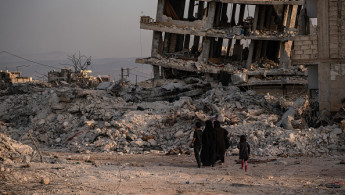EU exemptions on Syria sanctions do not mean normalisation, top spokesman says
Lead spokesperson for the external affairs of the European Union Peter Stano denied that recent exemptions from EU sanctions on the Syrian regime are a gateway to normalisation.
EU sanctions in Syria were designed so as not to stand in the way of humanitarian aid and target only Bashar al-Assad’s regime and those who support it, Stano told The New Arab’s sister site, Al-Araby Al-Jadeed.
"The vast majority of economic sectors, including food, medicine and medical equipment, are not subject to sanctions," he said, noting that the EU had amended its sanctions framework on Syria to facilitate the rapid delivery of humanitarian and medical aid in the aftermath of the devastating February 6 earthquake.
The massive quake destroyed large swathes of southeast Turkey and northwest Syria and has so far killed around 50,000 people.
Stano said the exemptions were temporary measures and related to a specific aspect, and had nothing to do with normalising ties between European countries and Assad.
He stressed that the EU’s position on the Syrian regime the same, this regime has no legitimacy and this is not the right time to normalise relations."
Answering a question on whether EU planes carrying aid and landing in Damascus Airport for the first time would eventually lift sanctions and allow for economic cooperation with the regime in the future, Stano reiterated that was not the case.
"Our aid is neither delivered nor distributed by the regime and its proxies, and we use UN agencies and trusted humanitarian organisations to provide assistance to those who need it," Stano told Al-Araby Al-Jadeed.
Assad, largely isolated for over a decade since violently crushing pro-democracy protests in 2011, has used the natural disaster as a way to mend ties with Arab states which had frozen relations with his regime.
Arab countries have sent high-level ministerial delegations to Damascus to meet with Assad, as the Syrian president has also visited countries like the UAE and Oman.
The Syrian conflict is believed to have killed over half a million people and displaced half of Syria’s pre-war population.





 Follow the Middle East's top stories in English at The New Arab on Google News
Follow the Middle East's top stories in English at The New Arab on Google News
![Israeli forces ordered bombed Gaza's Jabalia, ordering residents to leave [Getty]](/sites/default/files/styles/image_330x185/public/2176418030.jpeg?h=a5f2f23a&itok=_YGZaP1z)

